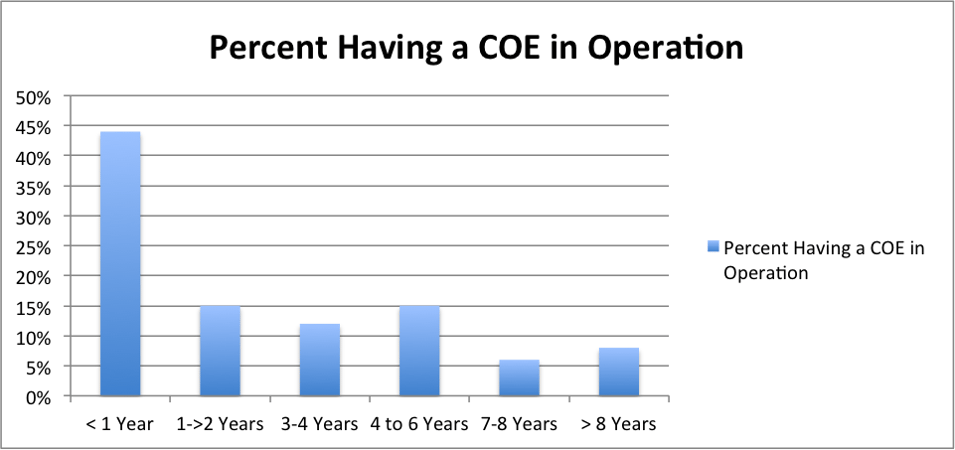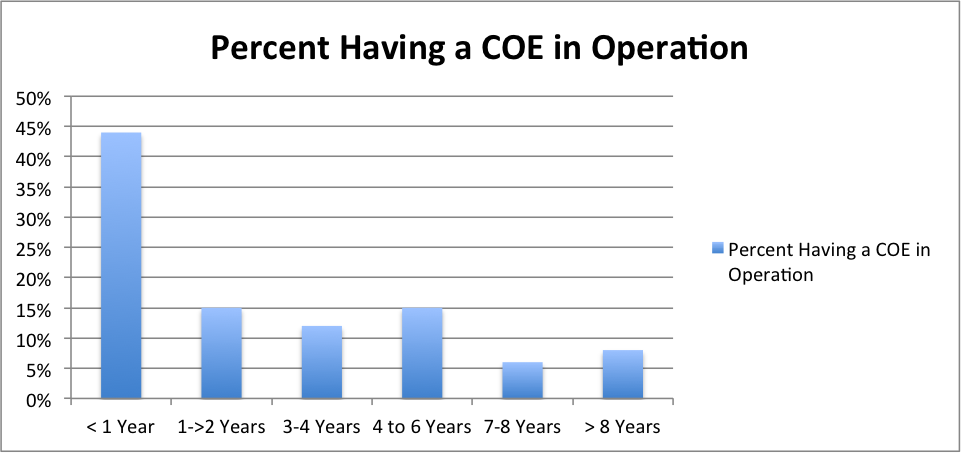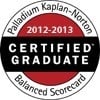Driving down TCO with a SAP COE
Though this chart showing the percent of SAP Customers who have a COE (Center of Excellence or some flavor of COE) is based on somewhat older survey data, the percentages still seem to hold true.
Why might it be that as companies mature, the percent actually using a SAP COE approach to manage their SAP platform seems to decline or level off dramatically?

Source: ASUG
Types of CoE
First off, we need to briefly define some relevant terms. There are really 3 types or levels of SAP Centers of Excellence or Centers of Expertise.
- SAP Competency Center
- SAP Center of Expertise
- SAP Center of Excellence
Each represents a different approach to a client's SAP support strategy and yield different business benefits.
SAP Competency Center
Operating Approach:
Provides an ‘always available’ application environment with extraordinary customer service delivered at a low cost.
Helps ensure both large and small changes to SAP systems are managed properly. Large system updates may become follow-on SAP projects themselves and they have the expertise to do many of these themselves. They also can bring in 3rd party consultants as needed.
SAP Center of Expertise
Operating Approach
Provides technology-enabled solutions to business problems that increase the value of technology investments.
SAP Center of Excellence
Operating Approach:
Generates business value by solving business problems through a combination of business process improvements and innovative use of technology.
Often part of global SAP solutions where a global template with local variations was used. Will also help standardize business processes where conglomerates own many, non-related businesses.
Source: ASUG2015
As a practical matter, each of these approaches represents a COE maturity model of an SAP installation. Most importantly, each represents a progressively higher cost to operate model.
As well, they may also indicate the size of the SAP installation.
For many SAP customers, especially those operating at the SAP Competency Center Level, a major focus is “Increased likelihood of shifting resources to external resource provider source to drive down TCO”
Translation:
They need SAP Functional Consulting at the lowest possible cost to keep their TCO down.
But they also need high quality SAP Consulting resources that know their industry, their solution and who can help them get to the next level of maturity.
The Need for Change Never Changes
Regardless of the size of the business or their SAP Maturity Level, they will face a near constant need for updating their SAP system. SAP technologies constantly evolve, and the complex SAP System Landscape requires rigorous care and feeding for optimal results.
A key struggle will be to operate on a process level versus a functional business unit level.
Especially within smaller organizations who may not have fully documented business processes, nor business process owners, they will need the expertise of external business process experts with both SAP expertise and expertise in their particular industry. These experts can help with day-to-day SAP operations, including adding/deleting users, searching for and applying relevant patches and looking for optimization opportunities. These experts are able to stay abreast of SAP product developments whereas most customers are focused on their day jobs.
Need a Solid Business Case
They will also need to be able to build a solid business case for their projects using commonly accepted business terms such as NPV.
SAP Transformation Process
Every SAP client is on a business transformation journey, whether intentional or not. The SAP CoE process is designed to drive SAP transformation success.
SAP Center of Expertise Roles and Responsibilities
Each SAP customer center of expertise will be customized to each customer's needs.
SAP CoE Team Structure
A SAP CoE can be anything from 1 to 3 people all the way up to very large teams, often measuring over 150 members.
SAP CoE Leadership
The SAP CoE leadership team is usually composed of experts in both SAP Project Management, one or more SAP modules (though usually at a higher, process level) and various SAP solutions. The CoE operating model is very flexible, and can be modified to meet the specific needs and capabilities of each customer.
SAP CoE Team members
SAP CoE team members typically have both hands-on business business and application expertise gained from working at the company prior to the SAP project implementation. They then learned their SAP module during the SAP implementation. In other cases, external SAP experts are recruited or contracted via third-party SAP service providers, such as SAP BW Consulting, Inc.
SAP Infrastructure Management
One of the critical functions (among many) is maintaining the SAP infrastructure environment. As your SAP changes, your business processes change and grow, your SAP environmental needs will evolve.
Building Your SAP CoE
Enterprises have the option to approach SAP CoE placement within their business landscape in two ways: either by establishing an in-house Center of Excellence or opting for outsourcing. The decision between these two options comes with its own set of advantages and disadvantages, depending on the specific needs and structure of the organization.
- Internal SAP Centers of Excellence offer the advantage of enhanced and immediate access to resources and personnel who possess a deep understanding of the intersection between SAP and business processes.
However, maintaining a full-time in-house team can be costly and may pose the risk of losing key staff members. Additionally, internal teams may have a limited grasp of the broader SAP landscape and optimal industry practices. -
By opting for outsourcing a CoE team, enterprises can effectively manage resource risks and establish SLAs (Service Level Agreements), which proves to be a more cost-efficient approach compared to maintaining an in-house team. Outsourced teams also possess a deeper understanding of SAP solutions and industry best practices.
However, it is essential to note that outsourced CoE teams necessitate comprehensive project overviews, meticulous support resource planning, and require accountability and ownership in BPO (Business Planning Outsourcing) practices.
Could You Benefit from Remote SAP Functional Consulting
That is why we recently developed the capability to support our customers with remote SAP Functional Consulting – to help clients achieve the lowest TCO while also dramatically improving their use of analytics.
Maximize business value of your SAP software investment
A SAP CoE is especially valuable as businesses migrate their SAP software to S/4HANA. Implementing a SAP CoE can be challenging since all businesses will require intense support as teams learn to fully adopt the IT and process changes that SAP S/4 HANA entails.
Role of the Business Process Architect in Supporting Changing Business Strategy
The role of a Business Process Architect is to oversee business transformation and is a link between business strategy and technology. They will oversee that all SAP processes are aligned with business processes and strategy.
How much could you save on SAP Functional Consulting Support?

People who read this also read:
- 10 Key Infrastructure Tips for SAP Implementation Projects
- Net Present Value NPV Template
- 10 Steps to Manage SAP Project Sub-Contractor Risk
- How to Manage Change Management Risk
- 13 Keys to ERP Implementation Project Work Scheduling Effectiveness
Complete Shopify Consulting Support
At SAP BW Consulting, Inc., we offer comprehensive Shopify consulting services designed to optimize your e-commerce operations. Our expertise covers efficient consumer response strategies, abandoned cart recovery, customer retention tactics, and e-commerce ROI strategies. We also provide support for Shopify store setup, customization, SEO best practices, and payment gateway integration.
As savvy business e-commerce consultants, we help businesses enhance inventory management, develop innovative Shopify websites, and implement Shopify analytics for data-driven decision-making. Whether you’re an established brand or a growing business, our expert team delivers tailored solutions for your specific needs.
Looking to maximize your Shopify store's potential? Book a meeting with us today.


